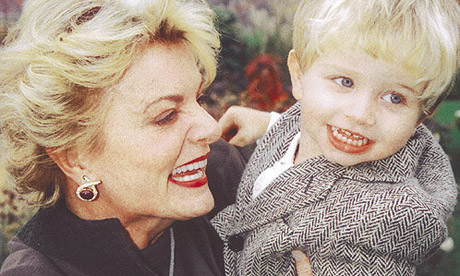
We were so shocked when our grandson developed autism. Christian was our first little boy and he had been growing up beautifully. He was meeting all his milestones – he had a large vocabulary and was almost potty-trained. Then, when my daughter and her husband had another baby and moved from the city to the country, Christian began to lose his speech. He started having tantrums.
We went to several doctors and they said that we should remain calm and not worry. To them I was just a hysterical grandmother. They said that it was probably because of the other baby and the move. And, they said, boys regress.
We went to five doctors and all of them said wait and see. Which, as it turns out, was the worst thing to do. With autism, time is your enemy. Early intervention and therapy are the best weapons you have. This idea that boys regress should not be allowed to persist any longer – not in these days of an autism epidemic. We lost nine months.
Finally, we saw a team of doctors in New York who told us Christian had classic autism. I didn't know what that was – well, except for the film Rain Man. The doctors said that the rise of autism was a concern for them, and that's how our journey began and we started our organisation, Autism Speaks.
My husband Bob and I went around the country visiting medical schools, teaching hospitals and scientists. A picture emerged that was very hard for me to understand. We went to the Centres for Disease Control, which is the arbiter of all things health-related in the US, and they told us that autism is the most significant childhood disorder in the country.
I was astounded. When I asked them why they weren't telling more people about it, they said: "Well, we don't want to disturb people. Paediatricians aren't sure of the diagnoses and it might just cause difficulty." One in 166 kids have autism – that's almost 1% of all boys. When you compare that to one in 24,000 kids with leukaemia, or one in 10,000 for Aids, or one in 7,000 for juvenile cystic fibrosis – you can see that doctors are living in a world of denial and defensiveness.
I knew that we had to somehow raise awareness. Bob and I approached the Ad Council, which has been around in the US for about 70 years. They present government adverts and public service announcements, like forest fires and drink driving. We entered a competition to see if they would take on our campaign, and they did. They produced some of the most startling public service announcements, and these have given us enough donated money to reach out across the US.
In most countries, autism is the most prevalent childhood disease – even more so than Aids and diabetes. And yet in both the US and UK it receives the lowest level of spending. A lot of it is because it originated in psychiatry – in the world of "mental health", which is not well publicised. Our aim is to get autism looked at in the light of day.
In the US, there is an 80% divorce rate among parents of autistic children. I've seen what my own daughter had to go through every day and it's horrendous. It's so isolating. I never saw a more desperate group of people than the parents of autistic children. The costs were terrible – they had no insurance, and were discriminated against by the education and medical systems.
We think autism is a relatively new epidemic. After all, where are all the 50-year-old autistic people? They just don't exist in these numbers. It could be genetic or there could be environmental factors. Both in the US and UK we have a big vaccine issue. We know what vaccines prevent, but do we really know their effects?
At the moment families with autism are spending an inordinate amount of time and money to secure what they're already entitled to. If you have cancer the world takes care of you; everyone's there for you – hospitals, clinics, insurance companies. But if you have autism you have to fight for every benefit. People have to understand what their rights are and not feel that they have to beg.
We managed to get our message to both John MacCain and Barack Obama. Both of them understand the epidemic proportions and seriousness of autism, and it was the only disease that either of them mentioned in their televised debate.
However, while everyone tells us they are sympathetic to our cause, they all say that they have no money. It's a bit like a country club where only the members get priority. But I say that priority should be based on the prevalence of the disease. It's hard to change people's way of thinking, but that's what we at Autism Speaks have to do. We tell people that we won't be satisfied until we see spending matched with need and prevalence. Autism speaks and finally the world is listening.

